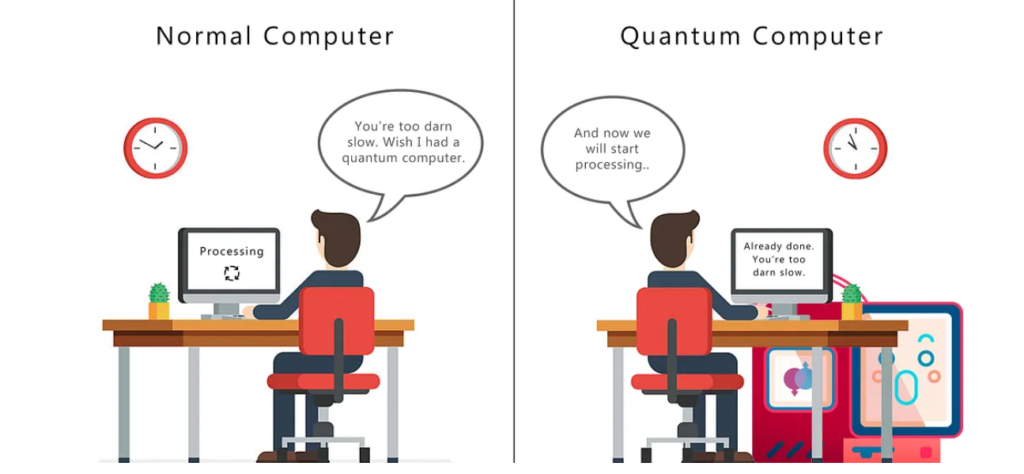Quantum computing represents a revolutionary leap in technology, offering unprecedented power to solve complex problems beyond the capabilities of classical computers. But how does quantum computing work? This article delves into the principles of quantum computing, its mechanisms, and its implications for the future.
Introduction to Quantum Computing
Quantum computing is an advanced computing paradigm that leverages the principles of quantum mechanics to process information in ways classical computers cannot. Unlike classical computers, which use bits as the fundamental unit of information (either 0 or 1), quantum computers use quantum bits or qubits.

The Basics of Quantum Mechanics
To understand how quantum computing works, it’s essential to grasp the basics of quantum mechanics, the branch of physics that governs the behavior of particles at the atomic and subatomic levels.
Quantum Superposition
One of the fundamental principles of quantum mechanics is superposition. Unlike classical bits, which are binary and exist in one state at a time (0 or 1), qubits can exist in multiple states simultaneously. This means a qubit can be both 0 and 1 at the same time, allowing quantum computers to process a vast number of possibilities simultaneously.
Quantum Entanglement
Another critical principle is quantum entanglement, a phenomenon where qubits become interlinked such that the state of one qubit instantly influences the state of another, regardless of the distance between them. This entanglement allows quantum computers to perform complex computations more efficiently by correlating qubits in ways classical bits cannot.
Quantum Bits (Qubits)
Qubits are the cornerstone of quantum computing. They differ significantly from classical bits due to their ability to represent multiple states simultaneously through superposition. This capability enhances computational power and efficiency.
Physical Realizations of Qubits
Qubits can be implemented using various physical systems, including trapped ions, superconducting circuits, and quantum dots. Each approach has its own advantages and challenges, but they all leverage quantum mechanical principles to achieve quantum computing.
Quantum Gates and Circuits
In classical computing, logical operations are performed using logic gates (AND, OR, NOT). Quantum computing uses quantum gates to manipulate qubits. Quantum gates are fundamental operations that change the probabilities of qubit states and are used to build quantum circuits.
Types of Quantum Gates
Pauli-X Gate: Similar to the classical NOT gate, it flips the state of a qubit.
Hadamard Gate: Creates superposition, transforming a qubit’s state into a combination of 0 and 1.
CNOT Gate: A two-qubit gate that performs operations based on the state of another qubit.
These gates are combined to form quantum circuits that execute algorithms and solve problems.
Quantum Algorithms
Quantum algorithms exploit the unique properties of qubits to perform tasks more efficiently than classical algorithms. Some notable quantum algorithms include:
Shor’s Algorithm
Shor’s Algorithm is designed for integer factorization, which has significant implications for cryptography. It can factor large numbers exponentially faster than the best-known classical algorithms, potentially disrupting current encryption methods.
Grover’s Algorithm
Grover’s Algorithm is used for searching unsorted databases. It provides a quadratic speedup over classical search algorithms, making it invaluable for various applications where quick search results are essential.
Quantum Computing Hardware
Quantum computing hardware is still in the early stages of development. Several types of quantum hardware are being explored, each with its own approach to creating and manipulating qubits.
Superconducting Qubits
Superconducting qubits are made from materials that exhibit superconductivity at very low temperatures. They are created using circuits that can carry electric current without resistance, allowing for precise control of qubit states.
Trapped Ions
Trapped ion quantum computers use ions trapped in electromagnetic fields and manipulated with lasers. This approach offers high fidelity and long coherence times, which are crucial for stable qubit operations.
Quantum Computing vs. Classical Computing
The primary difference between quantum and classical computing lies in their processing power. Classical computers use binary bits and process information sequentially. In contrast, quantum computers utilize qubits and can process information in parallel due to superposition and entanglement.
Speed and Efficiency
Quantum computers have the potential to solve certain problems much faster than classical computers. For example, quantum algorithms can address optimization problems, complex simulations, and large-scale data analyses more efficiently.
Applications and Limitations
While quantum computing holds promise for fields such as cryptography, drug discovery, and financial modeling, it also faces challenges, including error rates and qubit stability. Classical computers remain more practical for many everyday applications due to their reliability and maturity.
Future Prospects of Quantum Computing
The field of quantum computing is rapidly evolving, with significant advancements expected in the coming years. Researchers are working on improving qubit stability, error correction, and scaling up quantum systems.
Quantum Supremacy
Quantum supremacy refers to the point at which a quantum computer can perform a task that is infeasible for classical computers. Google claimed to have achieved quantum supremacy in 2019, demonstrating the potential power of quantum computing.
Quantum Cloud Computing
Quantum cloud computing allows users to access quantum processors remotely. This approach enables researchers and businesses to experiment with quantum algorithms and applications without needing their own quantum hardware.
Conclusion
Quantum computing represents a transformative advancement in technology, offering capabilities far beyond traditional computing methods. By understanding the principles of quantum mechanics, qubits, quantum gates, and algorithms, we gain insight into how quantum computers work and their potential to revolutionize various fields. As research progresses, quantum computing may unlock new possibilities and solve complex problems that are currently beyond our reach.